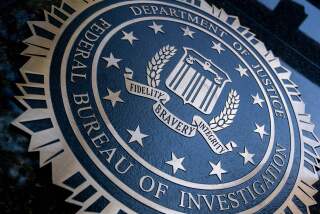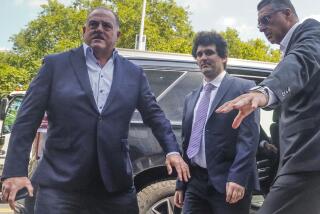Lawyers Tell of Unabomb Suspect’s ‘Hatred of People’
- Share via
SACRAMENTO — In the most detailed explanation for seeking the death penalty, federal prosecutors told a court Friday that Unabomber suspect Theodore Kaczynski is a calculating killer whose own writings show he “acted out of a deep-seated hatred of people and society.”
In a pretrial document intended to set forth reasons why Kaczynski should be put to death, prosecutors claimed that the hatred has persisted and grown throughout the former college professor’s life.
Without providing details, U.S. Atty. Paul Seave also revealed that at Kaczynski’s murder trial, set to begin Nov. 12, the government will show that the former mathematician’s “desire to kill preceded his choice of weapons.”
By trying to put Kaczynski, 55, on death row, the government is seeking to place him in the same category as some of the decade’s most notorious bombers, such as recently convicted Oklahoma City bomber Timothy J. McVeigh.
Seave’s 64-page document also added details to the portrait that has emerged of the reclusive Kaczynski, who spent many years living alone in the backwoods of Montana before his arrest in April 1996.
While living in a tiny cabin without electricity or running water, the Harvard-educated Kaczynski “drew on his knowledge of chemistry and physics to improvise dozens of bombs and bomb components from scraps of wood and metal, spare hardware and ordinary household products,” Seave said.
Moreover, he said, “the defendant’s career as the Unabomber reflects a remarkable stealth and patience; for example, Kaczynski once waited six years between bombings so that he could improve his bomb-making abilities.”
U.S. District Judge Garland E. Burrell Jr. is scheduled to hold a hearing Oct. 24 on the death penalty arguments.
Prosecutors believe that Kaczynski is the anti-technology bomber responsible for a string of bombings starting in the 1970s.
In Sacramento, he faces charges in the 1985 death of computer store owner Hugh Scrutton and the 1995 slaying of timber industry lobbyist Gilbert Murray and attacks that injured a UC San Francisco geneticist and a Yale University computer scientist. A grand jury in Sacramento indicted Kaczynski on 10 counts of illegally transporting, mailing and using bombs. He has pleaded not guilty.
Kaczynski also has been charged in New Jersey in the bombing death of advertising executive Thomas Mosser.
In documents filed in May, the Justice Department said Kaczynski should be put to death if convicted in the deaths of Murray and Mosser. They primarily cited the carefully premeditated nature of the crimes.
But last month, Kaczynski’s attorneys sought to overturn the government’s decision, challenging the federal death penalty as unconstitutional.
Prosecutors on Friday dismissed the defense challenge, saying it was without merit and that similar arguments have been repeatedly rejected by other courts.
They also cited several aggravating factors for pursuing the death penalty, including Kaczynski’s alleged lack of remorse and their contention that he is a continuing danger to the public.
In buttressing their argument, prosecutors said that more than a year ago, they provided Kaczynski’s lawyers with written notice of 16 bombings they attributed to him.
Further, Seave said, the government has sketched out details for the defense of “numerous other acts of violence and vandalism attributed to him over a 25-year period.” But prosecutors did not shed further light on the comment.
Prosecutors also cited stacks of documents found in Kaczynski’s cabin and seized by authorities.
They said Kaczynski’s own handwritten documents will form a central part of the case against him.
In another development Friday, Burrell ordered that the identities of jurors in the case--like those at McVeigh’s trial--will remain anonymous until after Kaczynski’s trial.
Burrell cited the potential for harm to jurors, noting that a number of victims and possible witnesses have “received threats from the public and unwanted and disturbing contacts from the media.”
Kaczynski’s attorney, Quin Denvir, has told the court that his office had obtained a publicly distributed document that contained names, addresses and/or phone numbers of about 18 people who were supposed to be “Unabom witnesses” and which suggested a game of contacting and scaring them.
A coalition of news organizations, including The Times, argued that keeping the jurors’ names public would in no way harm Kaczynski’s right to a fair trial.
More to Read
Sign up for Essential California
The most important California stories and recommendations in your inbox every morning.
You may occasionally receive promotional content from the Los Angeles Times.













